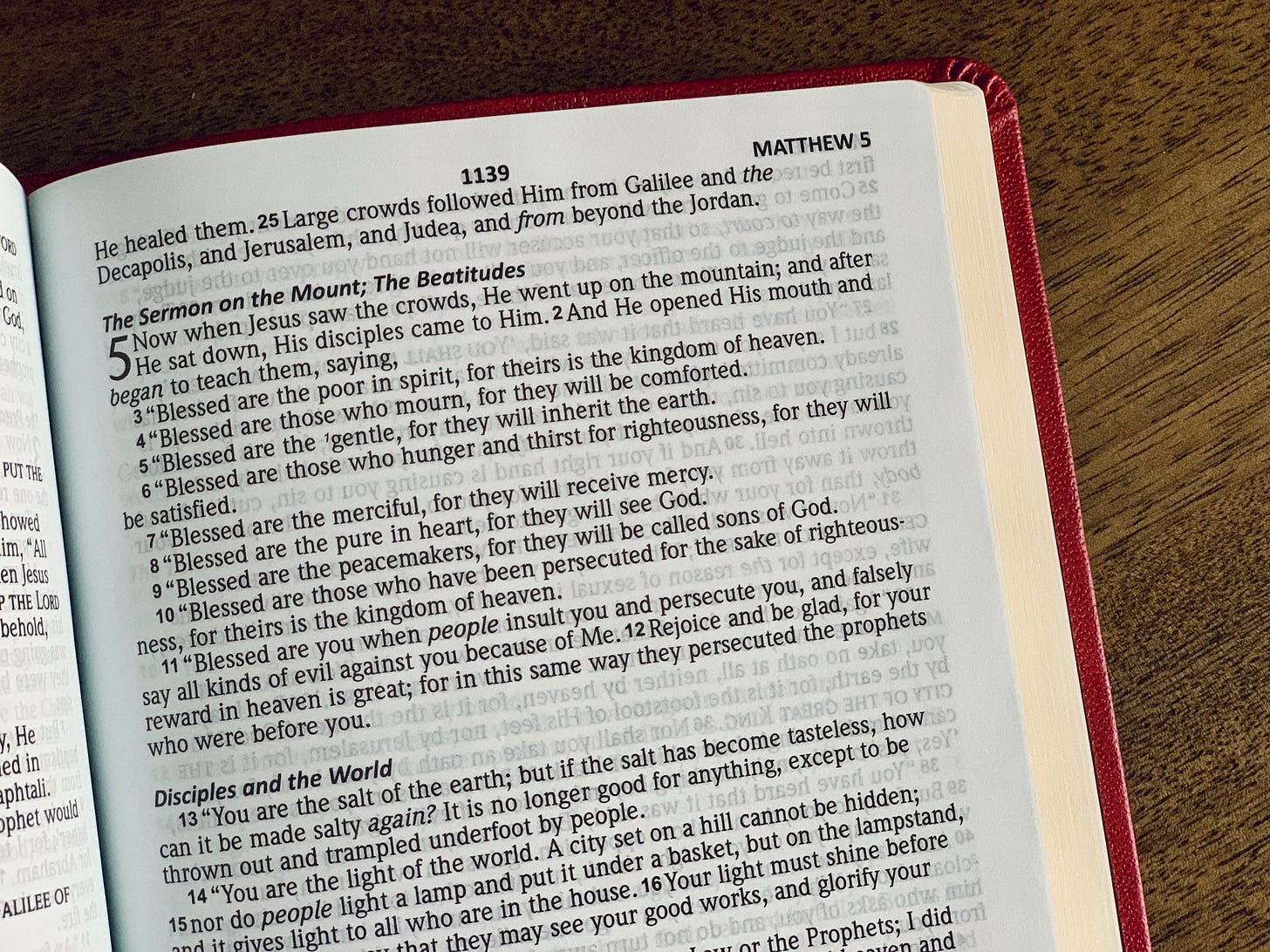Objective Truth and Why It Matters
Exploring the Life and Death Consequences of Abandoning Objectivity
At the foundational level, Christianity is a religion of objective truth. Everything about our faith, even that Jesus is Lord and Savior, is grounded in the knowledge that God is Creator and in knowledge of His character. Without that truth and all of the implications that flow from it, we have no objective ground to judge what is really true. While this topic may seem philosophical in nature, it is actually one of the most real conversations we can have and ultimately is responsible for life, death, and justice… or the lack of it.

Objective truth means that truth is not grounded in one’s own thoughts, feelings, or emotions. Instead, the source of truth is an unchanging standard, such as the Creator God. There are things about our existence that are fixed, unchanging, because God has defined Creation and its parameters according to His character. Philosophers have long debated the ‘feeling’ you get in your gut that ‘tells’ you when something is right or wrong. While the philosophers debate, there are still observable realities that prove truth is objective. We, as in humanity, all agree on some level of objective truth in certain moral imperatives - such as murder is wrong. The Christian answer to why humanity shares these universal imperatives is that we are created in the image of God and as such we are intrinsically aware of aspects of His character. We are made that way. It is His character, of which He created us in the image of, that points to truth. We believe in a supreme law given by the Supreme Lawgiver. We also believe the Holy Spirit is active, moving people, nudging them if you will, toward God, knowledge of Him, and objective truth.
On the opposite side of the spectrum is the idea that is prevailing in our culture: truth is subjective. This idea means that one’s own beliefs, thoughts, feelings, experience, and emotions define what is true, and it differs for each individual. This is where we often hear statements like ‘I’m living my truth’ or ‘You do you, I’ll do me’ and my favorite ‘Well, that may be true for you, but it is not for me.’ These may just seem like things people say, but are statements about what truth is that people use to justify their beliefs and actions. There are some things that are inherently subjective, like if something is enjoyable, but that is not what is being discussed.
The lack of distinction between these two competing visions of truth is being willingly ignored in our churches while we all suffer for it. What do I mean? I mean that at every point where the Church is in conflict with the culture and struggles to maintain its identity, with many compromising, the question is not being asked: What is truth, is it subjective or objective? This is the question that matters first instead of prematurely attempting to answer the hot button questions like:
Is abortion permissible?
Is homosexuality a sin?
How does the Church interact with modern gender issues?
Is the Bible inerrant?
How does the Church respond to injustice? etc.
These sorts of questions are attempting to be answered without first defining truth, or by people who have not defined truth, or have even thought about it. Often times those who may hold to objective truth are giving the upper hand away in these conversations as those who hold to subjective truth can redefine anything they say at will. We can no longer relegate these conversations about objective and subjective truth to the lecture halls of university philosophy departments. Our society has already moved on from that and is viciously contending for subjective truth to rule the public square. In most ways, they have already taken the public square as we have idly watched. Just look up any of these questions on Twitter or any social media platform and read the replies, or read any news article. Nearly everyone, Christians included, are arguing from a subjective standard. It is important that Christians, and those who may not be but believe in objective truth, do not give up this moral high ground in society. Life and justice depend on it as we will explore shortly.
Exclusivity
Exclusive is a bad word at church. At the root of our struggle to embody objective truth is our struggle with exclusivity - I have seen this personally for years in countless churches. Over the last forty years or more, Christianity (particularly of the evangelical stripe) has lived and grown in the space of being seeker sensitive. Our church buildings, liturgies (or lack thereof), worship music, and even doctrine has been construed to fit this model. We have done everything in our earthly power to make church more appealing, more comfortable, and more inclusive to attract younger people. Admittedly, in some cases, there has been great success. But nearly five decades into this continent-encompassing strategy the question has to be asked: where are the disciples? Christian disciples must affirm that Christianity is an exclusive religion. Jesus said it himself: “I am the way, the truth, and the life. No one comes to the Father except through me” (John 14:6). Where are the people who, through this inclusive church-growth strategy, have become exclusivists like Jesus? Ironically, as Winfield Bevins has notes in his book Ever Ancient, Ever New, it seems young people actually are returning to the Church, but not the seeker-sensitive one, they are attracted to more ancient and liturgical forms of the faith.
Christians must affirm that Christianity is an exclusive religion. The Church does not exist to widen its breadth and expand its parameters so everyone can fit inside. It exists as the bride of Christ so that through its witness people can be transformed by the saving grace of Jesus Christ and conformed to the holy image of God through the sanctifying power of the Holy Spirit. We change back to who God intended us to be to join the Church, the Church does not change so we can fit in. It is because of the Gospel of Jesus Christ that change is possible, and promised, to those who seek him “in spirit and truth.”1
Justice
Jesus has what is, in my opinion, one of the most interesting exchanges in the Gospels with Pontius Pilate. After the Jewish leaders brought Jesus to Pilate to try to convince him to put Jesus to death, Jesus and Pilate have a philosophical discussion about truth and justice.
Then Pilate went back into the headquarters, summoned Jesus, and said to him, “Are you the king of the Jews?”
Jesus answered, “Are you asking this on your own, or have others told you about me?”
“I’m not a Jew, am I?” Pilate replied. “Your own nation and the chief priests handed you over to me. What have you done?”
“My kingdom is not of this world,” said Jesus. “If my kingdom were of this world, my servants would fight, so that I wouldn’t be handed over to the Jews. But as it is, my kingdom is not from here.”
“You are a king then?” Pilate asked.
“You say that I’m a king,” Jesus replied. “I was born for this, and I have come into the world for this: to testify to the truth. Everyone who is of the truth listens to my voice.”
“What is truth?” said Pilate.2
Then, Pilate turns to the crowd in Jerusalem and asks them to decide who they will release, as this was a tradition to release a prisoner during the Passover festival. The crowd chose Barabbas and Pilate washed his hands as the crowd clamored for Jesus’ death by crucifixion.
Jesus gave Pilate the truth, the objective truth, that He is King and followers of truth are His followers. To this Pilate, in near prophetic fashion, replicates postmodernist thought and says “What [even] is truth?” This is a clear rejection of objective truth. Pilate was confronted with reality, even warned by his pagan wife of all people that Jesus was an innocent man, and yet his response echoes the modern sentiment that what is true to me produces the best outcomes for me, others be damned.
Pilate’s me-first sense of truth is a testament to what plagues subjective truth. Because there is no standard of absolute truth, subjective truth is ultimately about the desires, passions, and concerns of one’s self overruling the desires, passions, and concerns of others. It is fundamentally selfish.

Because Pilate rejected the truth about Jesus and allowed him to be crucified and Barabbas freed, objectively a grave injustice was done, and justice was not served by the one entrusted to serve it - the governor, Pilate. When we forfeit objective truth we ultimately forfeit justice in every capacity. The erosion may be slow and occur over time, but given time what our society accepts as truth when relativity is the guiding principle will continue to drift further and further from what is in reality true. Grave injustices follow the moral compass of subjective truth.
Life and Death
As we have discussed, it is the erosion of objective truth that is leads to injustice and along with it, ultimately to unjust death. The very essence of what it means to be human is lost without objective truth as we continue down the path of subjectivity. The further we go, the less the fundamental truth that human life is created in the image of God (imago Dei) is apparent. Without the imago Dei, a whole host of tragedies are possible.

It is the loss of the imago Dei that led to the catastrophic loss of life in the 20th Century. We dare not let the horrors of godless communism and fascism erode from our memories, they serve as stark reminders of this truth. Modern estimates put the death toll of communism at over 94 million3 and Nazism at 17 million.4 The loss of one person created imago Dei is tragic and should give us pause… numbers like this, so recent in our history, should cause lament and make us ask ‘Why? Why could those people who committed such evil not see the intrinsic worth of each human being created in the image of a loving Creator?’ Some may accuse me of boogeyman tactics by relating communism and Nazism to modern subjective morality, but that’s not the case, this is what occurred among humanity in our recent history. Being subjective about morality and truth does not make you a communist or a Nazi, but it does create a world in which the atrocities they committed are achievable. There must be a standard that recognizes the objective worth of persons to prevent the powerful from oppressing and killing whomever they will.
To that end, you can see the influence of objective truth in documents like the Bill of Rights here in the U.S., and the UN’s Universal Declaration of Human Rights. Despite these moral documents we all supposedly subscribe to, our century is not on a hopeful trajectory. In China, the world is unsure exactly what is happening with the Uyghur peoples, but estimates are not good and genocide occurring right now is a probability.5 Put things closer to home, and we are guilty of denying the image of God as well. In 2019, there were 629,898 abortions performed murdering pre-birth human beings,6 and likely close to that number or more in Europe - historically the places where law and government have been most influenced by Christian morality and objective truth. There is still much work to be done, and Gospel to be spread.

Being people of objective truth and being religious exclusivists absolutely is an issue of life or death that must be held to uncompromisingly in the Church of Jesus Christ. To champion objective truth is to champion the poor, oppressed, the widow, and the orphan. We have a mandate, a Great Commission: to give the world the Gospel so that, among the restoration of all things, everyone would know the inherent worth of each human life. So, one day when “every tear is wiped away, and death will be no more”7, we won’t have to ask the question ‘Why?’ anymore.
John 4:23-24
John 18:33-38 (CSB)
https://reason.com/2013/03/13/communism-killed-94m-in-20th-century/
https://www.statista.com/chart/24024/number-of-victims-nazi-regime/
https://www.reuters.com/world/china/us-lawmakers-call-un-uyghur-rights-report-before-chinas-olympics-2022-01-18/
https://www.cdc.gov/mmwr/volumes/70/ss/ss7009a1.htm
Revelation 21:4


